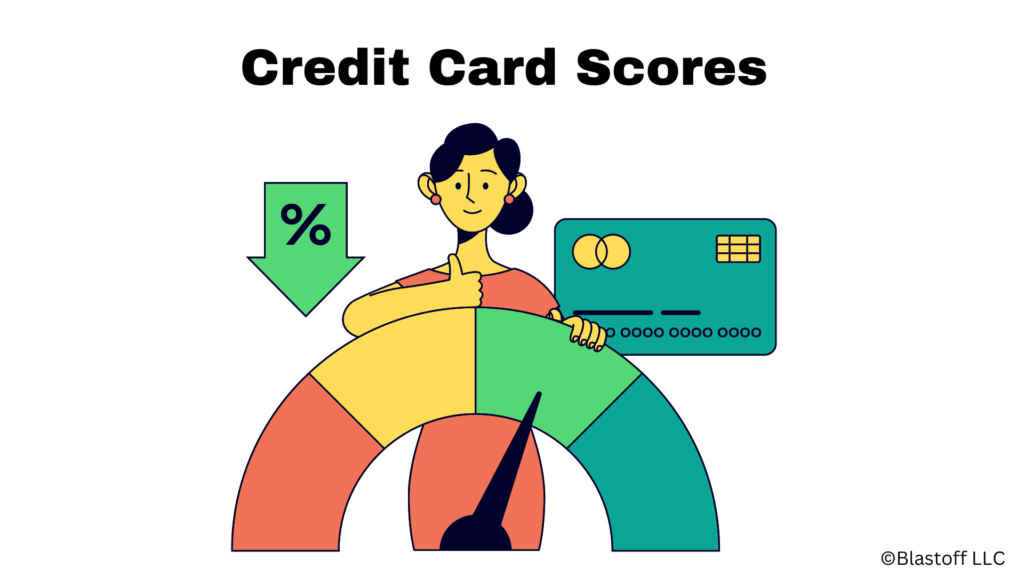What is My Credit Score? (Guide for College Students)
College is an exciting time filled with new experiences and opportunities, but it can also be a time of financial stress for many college students. Between tuition, housing, books, and other expenses, accumulating debt is manageable. Also, managing your debt wisely can positively impact your credit score, making it easier to get loans, credit cards, or even a job after graduation.
In this blog post, we’ll explain the basics of credit scores and debt management for college students. We’ll cover a credit score, its calculation, and why it’s essential. We’ll also discuss strategies for managing your debt, including creating a budget, making timely payments, and avoiding common pitfalls like overspending and high-interest loans.
What are Credit Scores?

Your credit score is a number that represents your creditworthiness – in other words, how likely you are to pay back money that you borrow. Credit scores are used by lenders, credit card companies, landlords, and even some employers to determine whether you’re a reliable borrower.
Credit scores range from 300 to 850, with higher scores indicating better creditworthiness. Here’s how scores are generally classified:
- Excellent: 800-850
- Very good: 740-799
- Good: 670-739
- Fair: 580-669
- Poor: 300-579
Your credit score is calculated based on several factors, including:
- Payment history
Your track record of making timely payment is the most crucial factor in determining your credit score. Late payments, missed payments, and defaulted loans will lower your score. - Credit utilization
This is the amount of credit you’re using compared to the total amount available to you. High credit utilization can lower your score, so keeping your balances low is best. - Length of credit history
The longer you’ve used credit, the more reliable you appear to lenders. You may have a lower score if you’re new to credit because you haven’t established a long enough credit history. - Types of credit
Having a mix of different types of credit, such as credit cards and student loans, can help boost your score. - Recent credit inquiries
Every time you apply for credit, it shows up on your credit report as a “hard inquiry.” Too many hard inquiries in a short period of time can lower your score.
How Can I See My Credit Scores?
There are several ways to see your credit score. Here are a few options:
- Check with Your Bank or Credit Card Issuer
Some banks and credit card companies offer free credit scores to their customers as a benefit. Check with your bank or credit card issuer to see if they provide this service. Usually, you can see your credit scores on your online banking app. - Use a Credit Monitoring Service
There are many credit monitoring services available, such as Credit Karma, that offer free credit scores and credit reports. These services also provide alerts for changes to your credit report and other useful tools for managing your credit. - Purchase Your Credit Score
You can also purchase your credit score directly from the credit bureaus or through a credit scoring company such as FICO. Be aware that there may be fees associated with purchasing your credit score. - Request a Free Credit Report
While not a credit score, your credit report provides detailed information about your credit history, including your accounts, payment history, and other factors that affect your credit score.
How to Increase Credit Scores (FICO)
Debt is unfortunate for many college students, but it does not have to be crippling. By managing your debt intelligently, you can enhance your credit score and put yourself up for a financially solid future. Consider the following strategies:
1. Create a Budget

Making a budget is one of the essential things you can do to manage your debt as a college student. A budget allows you to keep track of your income and spending so you can see where your money is going and make adjustments as required.
Begin by noting all of your sources of income, including any part-time work, scholarships, or financial help. Then, list your costs, such as tuition, housing, food, transportation, and subscriptions. Include any debt payments, such as credit card or school loan installments if you have.
You may make changes if you have a clear view of your revenue and spending. Look for ways to save cost, such as dining out less or finding less expensive housing. You can also seek methods to supplement your income, such as working longer hours or taking on a part-time job.
2. Make Payments on Time

As mentioned earlier, payment history is the most critical factor in determining your credit score. That’s why it’s crucial to make your debt payments on time, every time. Late payments can stay on your credit report for up to seven years, and they can significantly negatively impact your score.
Consider setting up automatic payments or reminders to ensure that you make your payments on time. You can also create a calendar or schedule to keep track of when your payments are due.
Don’t ignore the issue if you’re having trouble making your payments. Contact your lender or creditor and explain your situation. They may be able to work with you to create a more manageable payment plan.
3. Avoid High-Interest Loans

High-interest loans, such as payday or cash advances, can be tempting in a pinch, but these loans often come with extremely high-interest rates and fees, which can quickly spiral out of control.
If you need to borrow money, explore your options carefully. Consider low-interest loans, such as student or personal loans from a bank or credit union. You can also ask family or friends for a loan, but create a written agreement outlining the terms. You can find another job to have more income as well.
4. Keep Credit Card Balances Low

Credit card debt can be a significant source of stress for many college students. Try to keep your balances low to avoid getting into credit card debt. Ideally, it would be best if you aimed to use no more than 30% of your available credit.
If you carry a balance on your credit cards, make sure you pay more than the minimum payment each month. Paying only the minimum amount can result in a cycle of debt that’s hard to escape.
You can also consider applying for a credit card with a low-interest rate or a student credit card. Just be sure to use your credit card responsibly and avoid overspending.
5. Monitor Your Credit Report

It’s essential to regularly monitor your credit report to ensure no errors or fraudulent activities could negatively impact your score. Every year, you’re entitled to one free credit report from each of the three major credit bureaus – Equifax, Experian, and TransUnion. You can request your free reports at AnnualCreditReport.com.
If you find errors on your credit report, contact the credit bureau and the creditor to dispute the information.
Summary
Debt management and credit score maintenance might be complex but critical for your financial well-being. You may prepare for a financially secure future by developing a budget, making on-time payments, avoiding high-interest loans, keeping credit card balances low, and checking your credit report.
Remember that it is never too early to begin developing excellent credit practices. You’ll be better positioned to meet your financial objectives after graduation if you manage your debt and improve your credit score now.
